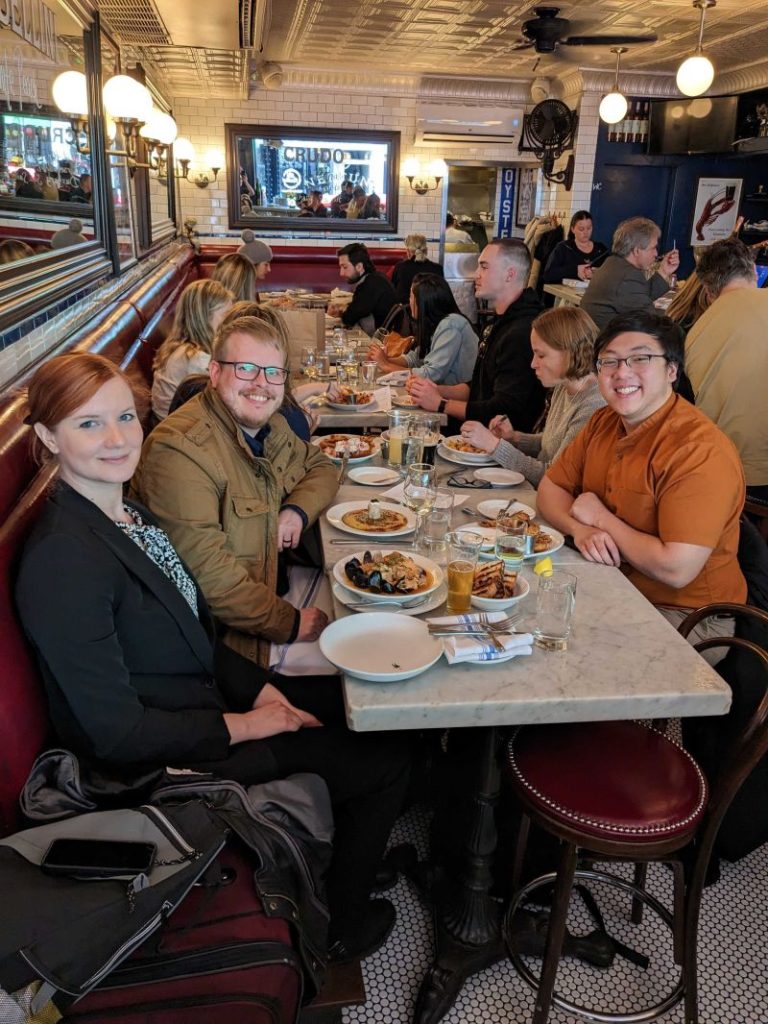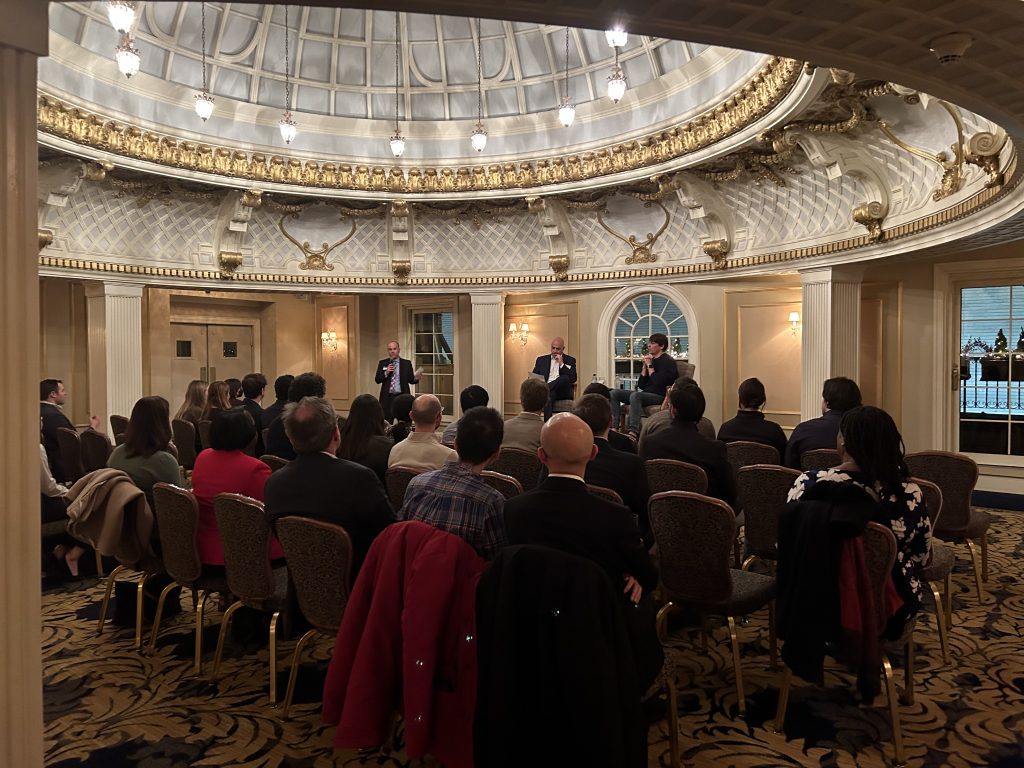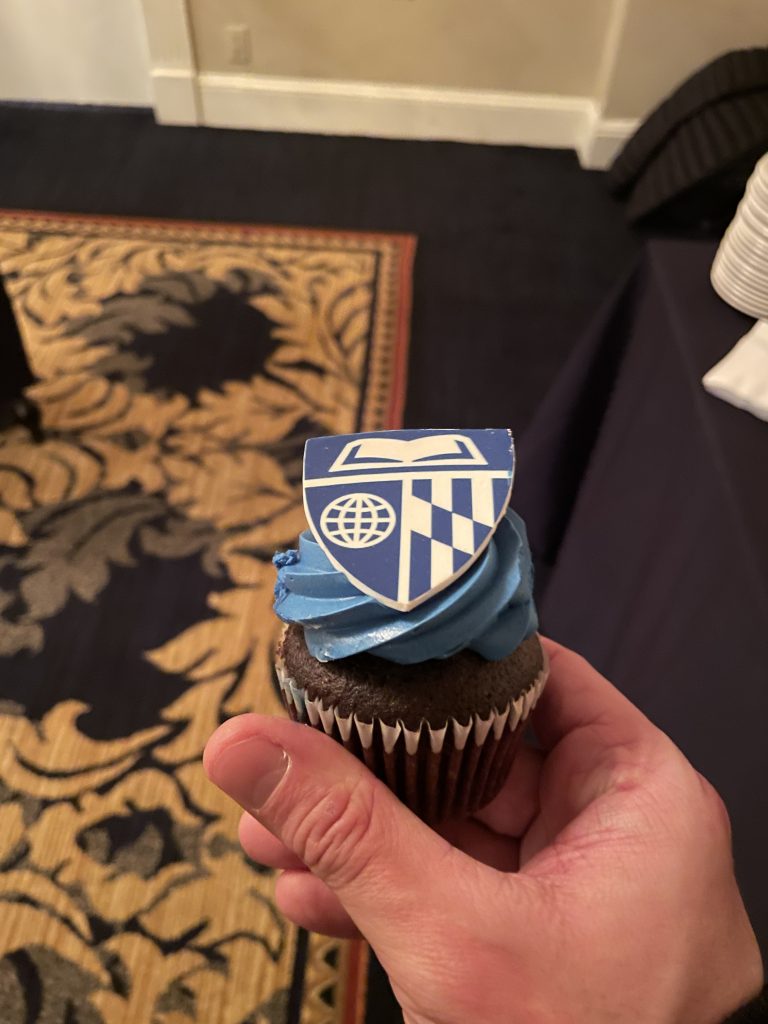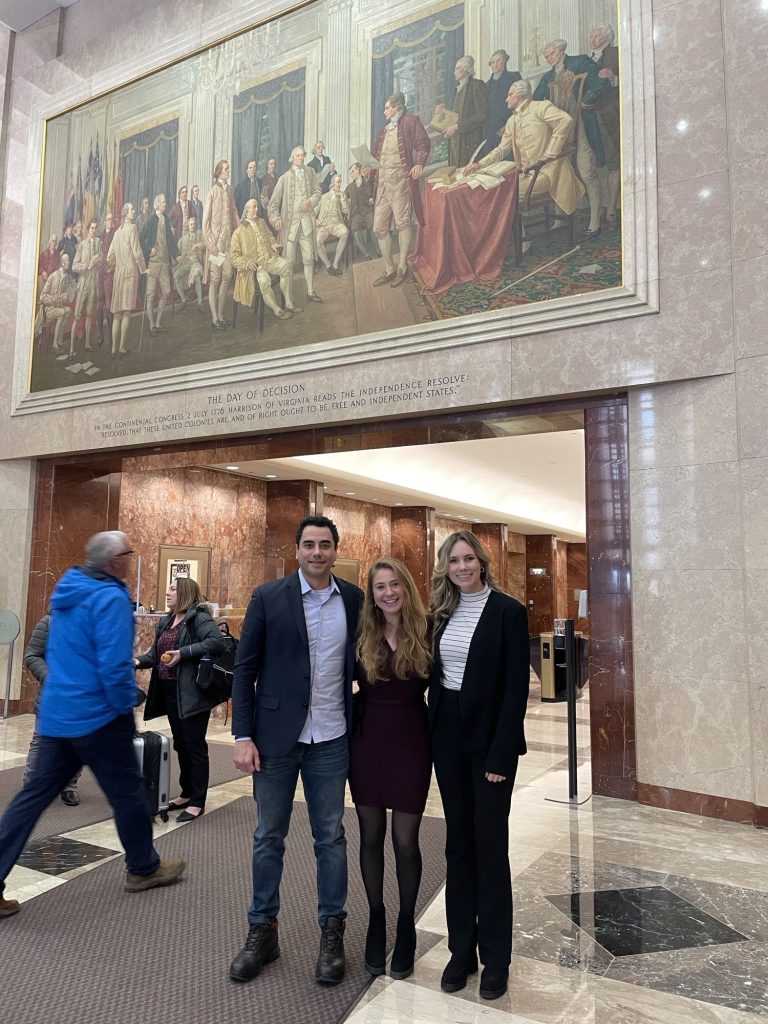The COVID-19 pandemic has presented unprecedented obstacles for students, affecting not only their academic pursuits but also their ability to network with potential employers and discover exciting career opportunities.
Sixteen graduate students from Johns Hopkins University’s School of Medicine, Bloomberg School of Public Health, and Carey Business School embarked on a 3-day immersive experience: the JHU Boston BioTrek. The trek provided students across different disciplines with a keen interest in the biotech industry a firsthand look into industry’s day-to-day operations. This included tours of biotech companies, cutting-edge research and development facilities, and the opportunity to meet with biotech executives, scientists, and alumni in the Boston region to foster new connections and mentoring opportunities.
For Rachael Workman, a doctoral student in the Biochemistry, Cellular and Molecular Biology graduate program, the Trek was a transformative experience. She shared, “The Trek helped with my professional development […] providing me opportunities to meet people and tour facilities that I wouldn’t have access to otherwise, and to practice synthesizing information and asking the right questions during presentations and networking events.”. Rachael’s experience is just one example of how the trek exemplified the importance of experiential learning opportunities for graduate students, empowering them with skills and connections to thrive in their future careers.
Exploring the Interconnectedness of Health and Business
The BioTrek was broken into two major networking phases, the first included visits to four biotech-focused companies and launchpads: Dewpoint Therapeutics, CRISPR Therapeutics, Tufts Launchpad BioLabs, and RA Capital. Each visit provided a glimpse into the day-in-the-life in a variety of roles in the biotech industry. For students venturing into the realm of healthcare, it’s not just about donning a lab coat and working with data; it’s about comprehending the multifaceted business landscape that underpins the entire industry. A solid grasp of healthcare economics and the complex business landscape can prepare students for the challenges they may face in their careers, as well as foster innovation and entrepreneurial thinking.
The first stop on the trip was Dewpoint Therapeutics, a biotech company utilizing biomolecular condensates to develop breakthrough therapies for various diseases. The students attended presentations on the types of therapies and investments that the company works on, followed by visits to the lab spaces, where they had the opportunity to network with professionals and ask questions.

On the second day of the track, the students visited CRISPR Therapeutics, a company known for its innovative gene-editing methodologies. They learned about CRISPR’s project selection and funding processes and the outcomes of their clinical trials. The students also had a tour of their facilities and a roundtable discussion with Hopkins alumni. Kirsten Bowland, a doctoral student in the Cellular and Molecular Medicine graduate program, reflected on the visit, “My favorite site visit was CRISPR Therapeutics. Having a chance to tour their facility and speak with their scientists helped me envision what my daily life could look like in a couple of years.” The professional connections Bowland made during the visit made a lasting impression: “It was the people I met who made the biggest impact on me and my future career.”
Leveraging Alumni Connections for Hopkins Students’ Career Success
At CRISPR Therapeutics, the students connected with successful alumni who are making waves in the biotech industry. Alex Harding, Head of Business Development at CRISPR, reflected on the event: “As a Hopkins alumnus myself, I know how useful it can be to talk to people working in industry to learn about the wide range of career paths available to graduates.” He noted the students’ engagement during the site visit, sharing, “The students were inquisitive and eager to learn about the gene editing medicines we are developing at CRISPR.”
A fireside discussion was also hosted by Carey Business School, during which Dean Alex Triantis and Christoph Lengauer (a successful venture capitalist and entrepreneur and Carey alumnus) shared their experiences and valuable insights about the biotech space in Boston.

Joe Varriale, who recently defended his dissertation in the Pharmacology and Molecular Sciences doctoral program, shared that the trek helped with getting plugged into the Boston biotech community, as well as his overall professional development: “I think this was a unique opportunity to not only hear about individuals’ experiences at the various companies we visited, but also get to network with them afterward in a casual setting.” The trek was also beneficial for Joe’s extracurricular projects at Hopkins, as Joe arranged interviews with alumni he met on the trek for the Hopkins Biotech Podcast.

The students also visited the Tufts Launchpad BioLabs, a coworking laboratory space catering to early-stage biotech start-ups, offering access to resources, mentoring, and funding opportunities. BioLabs proved to be a thriving community of researchers and entrepreneurs, and the students saw how the environment at BioLabs stimulates innovation and collaboration. This was followed by an evening speed networking event with JHU Alumnus hosted by the School of Medicine Alumni Office. They were able to learn from Biotech professionals and develop organic connections that will ideally lead to internship and employment possibilities.
Igor Austin, an MBA student from Carey Business School, shared his excitement about his conversation at the event with a Carey MBA alumnus and Biotech entrepreneur who provided him with valuable insights: “The highlight of my trip was meeting with the leadership of one of the most innovative and influential therapeutic companies globally. What’s more impressive is that four out of six leaders were from Hopkins, which speaks volumes about the influence of the Hopkins alumni network.” Igor noted that the interactions left him motivated and inspired to pursue his own career aspirations.
Synergizing University Resources to Support Students
The inaugural Boston BioTREK trip was a triumph, bringing together PhD, MPH, and MBA students from diverse backgrounds to learn from each other, while also allowing Hopkins to be recognized as a one-stop-shop for hiring talents who possess both scientific and business acumen. Valerie Bright, an MBA/MPH candidate, spoke highly of the experience, “This was a great educational opportunity to discover more about the biotech world and to meet and learn from the leadership at these companies. […] It was exciting to meet students from another area of Johns Hopkins, hear about their exciting work, and collaborate with them during the trip.”

At the final stop of the trek, RA Capital, the students gained insight into venture capital and funding for start-ups. They also learned about transitioning from academia to the business side of science from an HR and recruiting specialist. Jessica Sagers, Head of Engagement, RA Capital Management, shared, “The RA Capital Management team looks at the possibilities that biotech has to offer the world in the long run. In that timeframe, we count on today’s PhD and MBA candidates to become influential decision-makers throughout the innovation ecosystem.” She also drew attention to how treks such as these contribute to developing a diverse professional talent ecosystem in the Life Sciences: “We appreciated the opportunity through the BioTREK program to meet our industry’s future leadership, and we look forward to working closely with them to realize biotech’s potential to improve human health.”
By bringing together a diverse range of schools at Johns Hopkins University, the Boston BioTrek was able to create networking opportunities between students and high-quality employers. This successful cross-school collaboration has set a precedent for future treks to venture into unexplored regions and career paths, providing graduate students with invaluable experiences that will benefit them in their future endeavors in the Biotech space. The BioTrek was made possible by a PhD Professional Development Innovation Initiative grant from the Provost’s Office, along with the unwavering funding and support from various offices at Johns Hopkins University, including the Professional Development and Career Office, School of Medicine Alumni Office, Carey Business School Career Development Office, Carey Alumni Relations Office, and JHU Technology Ventures. The collaborative model will ultimately provide more hands-on experience and career exploration opportunities for students in the future.

